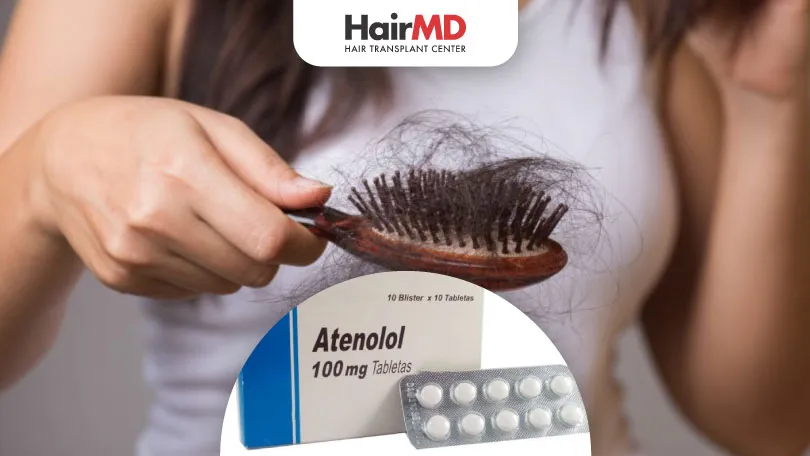
Learn how atenolol, a beta-blocker, can cause hair loss and explore ways to reverse it. Discover treatments and solutions like dietary changes, supplements, and therapies that help combat atenolol-induced hair loss.
The youth’s urban lifestyle is stressful, giving birth to several diseases that were not known to the earlier generations. Hair fall of 50 to 100 strands per day is normal. But if your hair is not growing back and there are balding patches on the scalp, then it’s a matter of concern.
The pandemic has also contributed a lot to this unsystematic lifestyle. A major part of the population around the world shifted their workspace to their home. While working on their devices, their diet and routine got altered.
Many started hogging junk food as mid-day snacking and midnight cravings which have increased medical conditions such as high blood pressure, migraines, and heart disorders. For the treatment of these conditions, you might need to take medications that can lead to other problems, including hair thinning and hair loss. Let’s understand how atenolol and hair loss are linked.
What’s covered in the article?
- Are Hair Loss and Atenolol Related?
- How to Reverse Atenolol-Induced Hair Loss?
- Conclusion
Are Hair Loss and Atenolol Related?
Atenolol is a beta-blocker drug used to treat high blood pressure, chest pain, irregular heartbeats, and migraines. As the name suggests, it blocks the actions of certain chemicals in the body. People consuming these drugs may experience atenolol-related side effects, including hair loss. These beta-blockers cause a temporary interruption in hair growth, leading to hair loss and cause hair thinning.
Atenolol induced hair loss can be of two types: telogen effluvium and anagen effluvium. Telogen effluvium affects the growth cycle causing temporary hair loss; however, new hair growth still continues in the hair follicles still in their growth stage. Anagen effluvium leads to thinning of hair and stops new hair from growing. This long-term hair loss condition can cause hair loss from the scalp, eyebrows, and eyelashes.
How to Reverse Atenolol-Induced Hair Loss?
Atenolol’s side effects hair loss are temporary. The doctor may switch to alternate medications. People tend to stop the medicines to avoid hair loss without seeking expert consultation. Once the medication is stopped, “reverse hair loss” is possible. The significantly visible growth can be seen only after 6 months or 12-18 months, depending on the condition.
Reversal of hair loss caused by atenolol is possible through consultation with a dermatologist. He/She will explain the connection between atenolol and hair loss and recommend dietary supplements to reduce hair loss caused by beta-blocker medicines. Get yourself tested for vitamin deficiencies such as iron, zinc, and biotin. Dietary supplements may help in controlling hair loss caused by medications. Certain procedures like mesotherapy and PRP may be suggested by your doctors, depending on your hair fall condition.
Do You Know?
Nearly 250 Patients Visit HairMD
Everyday For Various Hair Concerns?
(Your journey to healthier and fuller hair starts here!)
Meet Our Dermatologists
Conclusion
Still, confused about whether atenolol and hair loss are related or not? Seek experts at HairMD. Our experts facilitate a customised plan for patients to resolve your hair loss problems. Book your consultation today!
Further Reading
Redensyl vs Minoxidil: Which is the Better For Hair Growth?
Confused between Redensyl and Minoxidil? Discover which treatment works best for hair growth and how to choose the right one for you.
QR678 for Hair is Better than GFC? An Honest Opinion by a Board-Certified Hair Dermatologist
IV drip for hair growth delivers essential vitamins directly into the bloodstream to reduce hair fall and improve hair quality. Doctor-guided treatment.
7 Benefits of IV Drip Therapy for Healthy Hair
Discover how IV drip therapy nourishes hair follicles, reduces hair fall, and improves hair growth. The doctor explained the benefits.
IV Drip for Hair Cost in Pune | HairMD Doctor Guide
IV drip for hair growth delivers essential vitamins directly into the bloodstream to reduce hair fall and improve hair quality. Doctor-guided treatment.
Have thoughts? Please let us know
We are committed not only to treating you, but also educating you.










